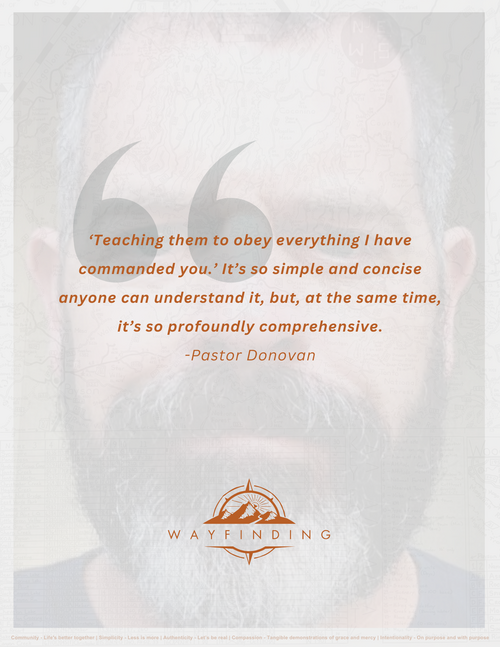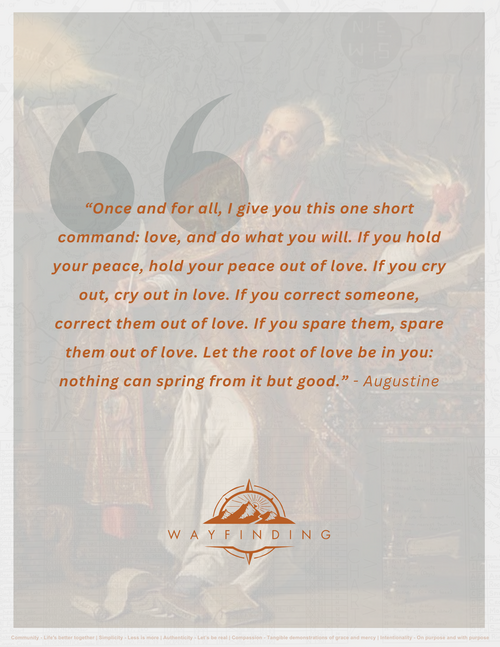Wayfinding Week 3

Wayfinding… the ancient method of navigation used by explorers and travelers that’s still being used today.
Expedition - A journey undertaken by a group of people with a definite objective.
- Set your course.
- Maintain your course.
- Arrive at your destination.
Expedition - A journey undertaken by a group of people with a definite objective.

It is absolutely essential, that in our journey of faith, our course is set. We have to know where we’re going. You can’t maintain a course if you didn’t first set one.
The definite objective of Expedition Church… Making disciples who love God and people.
That definite objective is a combination of what Christians have often called the two greats… the great commission and the great commandment.
Last week, we looked at the great commission
Matthew 28:19-20
[19] Go therefore and make disciples of all nations, baptizing them in the name of the Father and of the Son and of the Holy Spirit, [20] teaching them to observe all that I have commanded you.
Disciples have a curriculum. A disciple learns and teaches all that Christ commanded. A disciple devotes their life to learning about and living for Jesus.
Last week, I said that the great commission could not be clearer. It’s not tucked away or hidden, it’s front and center. The great commandment is very much the same way.
GREAT COMMANDMENT
The great commandment has been called great because it’s just as prominent. In terms of wayfinding, it’s a landmark that can be seen from miles in every direction.
Mark 12:28
And one of the scribes came up and heard them disputing with one another, and seeing that he answered them well, asked him, “Which commandment is the most important of all?”
Scribes in ancient Israel were highly educated men who studied the Law, transcribed the Law, and wrote commentaries on the Law.
The scribe asking the question knows that there are precisely 613 commandments.
365 of them tell you things not to do.
248 are things you should do.
Moral, Civil, and Ceremonial
So the scribe says, “Okay Jesus, of all these 613 commandments, which is the most important?”
Mark 12:29–31
29 Jesus answered, “The most important is, ‘Hear, O Israel: The Lord our God, the Lord is one. (He’s quoting from Deuteronomy chapter 6) 30 And you shall love the Lord your God with all your heart and with all your soul and with all your mind and with all your strength.’ 31 The second is this: (quoting from Leviticus 19) ‘You shall love your neighbor as yourself.’ There is no other commandment greater than these.”
I want to make a few observations to help us understand just great this really is.
COMPREHENSIVE
Jesus tells us that the commands to love God and to love your neighbor form one single great commandment and that no commandment is greater. This is why it is called the great commandment.
He also says that this one great commandment summarizes the entire law.
Matthew, in his gospel, records Jesus this way,
Matthew 22:40
“On these two commandments depend all the Law and the Prophets.”
On these commandments, depend all the other commands. All 613 commands can be consolidated into one single great command. (365 no & 248 yes)
What does this mean? I love this.
Let’s focus on the big 10. Not the college Big 10 but the Bible big 10.
Name a big 10 commandment.
All commandments funnel into one commandment.
Romans 13:9-10
For the commandments, “You shall not commit adultery, You shall not murder, You shall not steal, You shall not covet,” and any other commandment, are summed up in this word: “You shall love your neighbor as yourself.” Love does no wrong to a neighbor; therefore love is the fulfilling of the law.
The definite objective of Expedition Church… Making disciples who love God and people.
That definite objective is a combination of what Christians have often called the two greats… the great commission and the great commandment.
Last week, we looked at the great commission
Matthew 28:19-20
[19] Go therefore and make disciples of all nations, baptizing them in the name of the Father and of the Son and of the Holy Spirit, [20] teaching them to observe all that I have commanded you.
Disciples have a curriculum. A disciple learns and teaches all that Christ commanded. A disciple devotes their life to learning about and living for Jesus.
Last week, I said that the great commission could not be clearer. It’s not tucked away or hidden, it’s front and center. The great commandment is very much the same way.
GREAT COMMANDMENT
The great commandment has been called great because it’s just as prominent. In terms of wayfinding, it’s a landmark that can be seen from miles in every direction.
Mark 12:28
And one of the scribes came up and heard them disputing with one another, and seeing that he answered them well, asked him, “Which commandment is the most important of all?”
Scribes in ancient Israel were highly educated men who studied the Law, transcribed the Law, and wrote commentaries on the Law.
The scribe asking the question knows that there are precisely 613 commandments.
365 of them tell you things not to do.
248 are things you should do.
Moral, Civil, and Ceremonial
So the scribe says, “Okay Jesus, of all these 613 commandments, which is the most important?”
Mark 12:29–31
29 Jesus answered, “The most important is, ‘Hear, O Israel: The Lord our God, the Lord is one. (He’s quoting from Deuteronomy chapter 6) 30 And you shall love the Lord your God with all your heart and with all your soul and with all your mind and with all your strength.’ 31 The second is this: (quoting from Leviticus 19) ‘You shall love your neighbor as yourself.’ There is no other commandment greater than these.”
I want to make a few observations to help us understand just great this really is.
COMPREHENSIVE
Jesus tells us that the commands to love God and to love your neighbor form one single great commandment and that no commandment is greater. This is why it is called the great commandment.
He also says that this one great commandment summarizes the entire law.
Matthew, in his gospel, records Jesus this way,
Matthew 22:40
“On these two commandments depend all the Law and the Prophets.”
On these commandments, depend all the other commands. All 613 commands can be consolidated into one single great command. (365 no & 248 yes)
What does this mean? I love this.
Let’s focus on the big 10. Not the college Big 10 but the Bible big 10.
Name a big 10 commandment.
- Why should you not kill? It’s not loving to murder someone.
- Why should you not have idols? It’s not loving to God to worship false gods.
- Why should you not steal? It’s not loving to take things from people without their permission.
- Why should you not commit adultery? It’s not loving to your spouse or to the person you’re committing adultery with.
All commandments funnel into one commandment.
Romans 13:9-10
For the commandments, “You shall not commit adultery, You shall not murder, You shall not steal, You shall not covet,” and any other commandment, are summed up in this word: “You shall love your neighbor as yourself.” Love does no wrong to a neighbor; therefore love is the fulfilling of the law.

Teaching them to obey everything I have commanded you. It’s so simple and concise anyone can understand it, but, at the same time, it’s so profoundly comprehensive.
APPLICATION
What does God want from you? Your love.
1 John 4:19
We love because he first loved us.
Yes, he wants your obedience, but obedience motivated by love.
Yes, he wants your sacrifice, but sacrifice motivated by love.
It is first and foremost a love relationship.
What does God want you to do? He wants you to love.
“Once and for all, I give you this one short command: love, and do what you will. If you hold your peace, hold your peace out of love. If you cry out, cry out in love. If you correct someone, correct them out of love. If you spare them, spare them out of love. Let the root of love be in you: nothing can spring from it but good.” - Augustine
APPLICATION
What does God want from you? Your love.
1 John 4:19
We love because he first loved us.
Yes, he wants your obedience, but obedience motivated by love.
Yes, he wants your sacrifice, but sacrifice motivated by love.
It is first and foremost a love relationship.
What does God want you to do? He wants you to love.
“Once and for all, I give you this one short command: love, and do what you will. If you hold your peace, hold your peace out of love. If you cry out, cry out in love. If you correct someone, correct them out of love. If you spare them, spare them out of love. Let the root of love be in you: nothing can spring from it but good.” - Augustine

There is no getting around the priority of love and the preeminence of love and the prominence of love and the paramountness of love in the New Testament.
PREEMINENCE OF LOVE
The Apostle John says…
1 John 4:7-8
Beloved, let us love one another, for love is from God, and whoever loves has been born of God and knows God. Anyone who does not love does not know God, because God is love.
Why would he be so passionate about love being an essential part of the Christian faith?
John was personally discipled by Jesus. He was one of Jesus’ closest companions. Jesus rubbed off on John. John followed in the dust of his Rabbi Jesus. He watched him. He listened to him. They spend three years of their lives together.
He personally heard the words come out of Jesus’ mouth…
John 13:34-35
“A new commandment I give to you, that you love one another: just as I have loved you, you also are to love one another. By this all people will know that you are my disciples, if you have love for one another.”
By this all people people will know that you are my disciples.
Let’s ask a question, what are most Christians counting on to make people know they are a disciple of Jesus?
Last week… make disciples…
Jesus says that the unbelieving world will have a standard by which they can determine whether or not a person truly is a disciple of his.
CONCLUSION
PREEMINENCE OF LOVE
The Apostle John says…
1 John 4:7-8
Beloved, let us love one another, for love is from God, and whoever loves has been born of God and knows God. Anyone who does not love does not know God, because God is love.
Why would he be so passionate about love being an essential part of the Christian faith?
John was personally discipled by Jesus. He was one of Jesus’ closest companions. Jesus rubbed off on John. John followed in the dust of his Rabbi Jesus. He watched him. He listened to him. They spend three years of their lives together.
He personally heard the words come out of Jesus’ mouth…
John 13:34-35
“A new commandment I give to you, that you love one another: just as I have loved you, you also are to love one another. By this all people will know that you are my disciples, if you have love for one another.”
By this all people people will know that you are my disciples.
Let’s ask a question, what are most Christians counting on to make people know they are a disciple of Jesus?
Last week… make disciples…
Jesus says that the unbelieving world will have a standard by which they can determine whether or not a person truly is a disciple of his.
CONCLUSION
Recent
Archive
2024
March
April
May
July
November
2023
December
Week 1- Circumstantial Peace DAY 1Week 1- Circumstantial Peace DAY 2Week 1- Circumstantial Peace DAY 3Week 1- Circumstantial Peace DAY 4Week 1- Circumstantial Peace DAY 5Week 2- The Peace Giver DAY 1Week 2- The Peace Giver DAY 2Week 2- The Peace Giver DAY 3Week 2- The Peace Giver DAY 4Week 2- The Peace Giver DAY 5Week 3 - Peace Givers DAY 1Week 3 - Peace Givers DAY 2Week 3 - Peace Givers DAY 3Week 3 - Peace Givers DAY 4Week 3 - Peace Givers DAY 5

No Comments